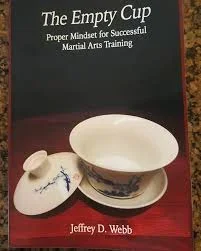The phrase "empty cup" as used in this book is with the first meaning above: to
have an open mind.
Ironically, other sections of the book essentially exhort the would-be martial art student to have faith in their instructor and determination to stick with their training. I'm not sure how you square the two. It's hard to have an open mind and to doggedly persevere following your instructor's advice.
It's almost like you have to enter training with an open mind and then close it to focus just on what you are told? Maybe I've got it wrong, but I have found this to be a failing of
some very "traditional" systems that are overly authoritarian and sometimes almost cult-like in their thinking.
--Not that this is the sole point of this book. It examines many other aspects of traditional training. The "empty-cup" adage is just one of a number of themes examined.

First off, I haven't read the book.
I think the two actually do go hand-in-hand. Having faith in the process is part of keeping an open mind. Let me use my experience teaching as an example. It's something I talk about a lot on here - my Master and I have different teaching philosophies, and I follow his philosophy because he's the master. It took a few years for me to see the benefits of his style of teaching over mine.
When I started, I had to have an open mind to trust that maybe my method isn't the only method that will work. Similarly, for a student, you have to have an open mind to trust that there will be some things in your training you might not see the point of right away (forms are a popular item here), but that exist for a reason and you will be better for training them.
Over the first year, I had to continue to trust my master. Because I didn't immediately see the results I wanted to see in the students, obviously his method isn't working and I would need to use my method, right? Wrong. I still needed to keep my mind open. I still needed to trust in his method, instead of my own.
Fast forward to now, four years into teaching at his school. I've seen his method work. Because I kept an open mind at the beginning, and continued to keep an open mind when I didn't have immediate proof that my fears were justified, I've seen his methods work. I've seen some students that his methods are definitely better for. And I've seen some students that my style would be better for.
I've come to a point now where his style is what I'm used to, and now I feel comfortable starting to question it. I've seen what his methods do and don't do. Because I've seen the process through, I feel now that having an open mind is looking at things that maybe could be done different. If not now at his school, maybe later down the road when I have a school to teach. (Although ideally some of these would happen now, so I can learn them before I get to that point).
So...
Open mind at the start of your training is to trust the instructors even if you're not sure on the methods.
Open mind at the intermediate level is to continue to trust the instructors even if you don't see the results yet.
Open mind at the advanced level is to question what you've come to know and how you can continue to improve.



